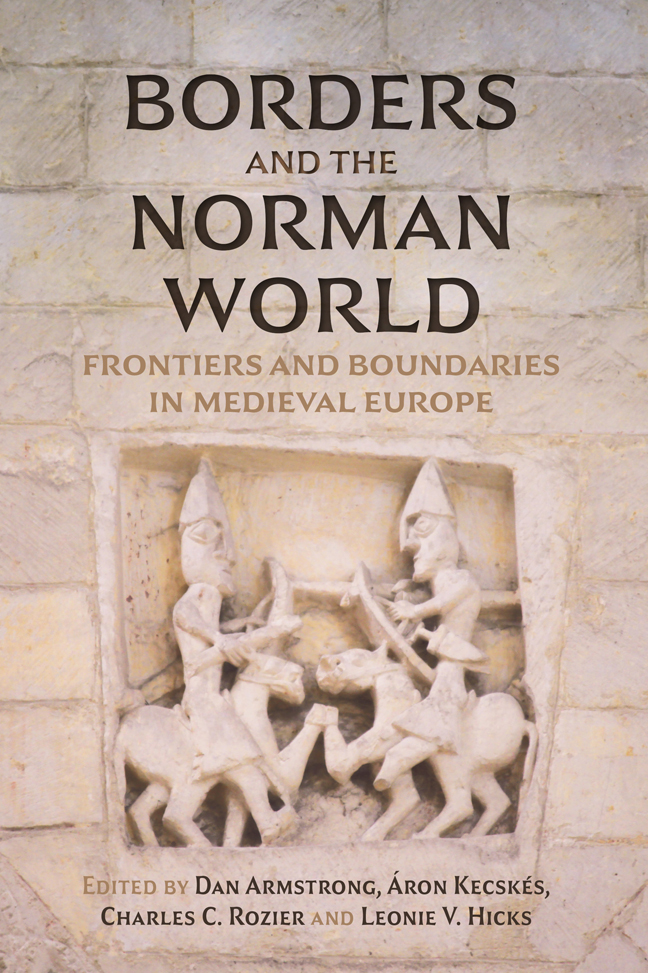Book contents
- Frontmatter
- Contents
- List of Illustrations
- List of Contributors
- Acknowledgements
- List of Abbreviations
- Naming Conventions
- Maps
- Introduction: Writing the Borders of the Norman World
- Part I Borders in and Around the Norman World
- Part II Ecclesiastical Borders
- Part III Conceptual Boundaries
- Afterword: Borders, Landscapes, and Seascapes
- Select Bibliography
- Index
10 - The Very Idea of a Border in Britain
Published online by Cambridge University Press: 22 February 2024
- Frontmatter
- Contents
- List of Illustrations
- List of Contributors
- Acknowledgements
- List of Abbreviations
- Naming Conventions
- Maps
- Introduction: Writing the Borders of the Norman World
- Part I Borders in and Around the Norman World
- Part II Ecclesiastical Borders
- Part III Conceptual Boundaries
- Afterword: Borders, Landscapes, and Seascapes
- Select Bibliography
- Index
Summary
Naturally, the mountains teem with herds and horsemen, the wild woodlands with swine, the wooded glades with goats, the pastures with sheep, the plains with cattle, the fields with ploughs; and each, although in truth is most lavish, nevertheless seems scant to the vice of an insatiable mind. For that reason lands are overtaken, boundaries pushed outward, neighbouring lands seized: whence markets are refilled with wares, and law-courts with quarrels, and kings’ courts with complaints. One reads, moreover, of such things in Isaiah: ‘Alas to you who yoke house to house, and couple field with field, all the way to the end of a place. Can it be that you will dwell alone in the middle of the earth?’ If, therefore, the prophet inveighs so against these who press all the way to a border, what may be said against those who press far beyond borders?
Gerald of Wales, describing his journey through Wales on the archbishop of Canterbury's crusade-preaching mission, paused to explain how greed among invasive religious orders had overrun borders in southern Wales. In his view the victim was Llanddewi Nant Honddu (Llanhonddu), known in ‘corrupt’ English as ‘Llanthony’; the aggressor, the Cistercians. This monastery, almost straddling the Anglo-Welsh border, had a daughter-house in Gloucester in neighbouring England. Gerald, born at Manorbier in Norman-controlled Dyfed, had received his early religious instruction at Gloucester. In keeping the Welsh placename of a place he likely knew from his youth, Gerald clung to the Welsh side of the linguistic divide. When writing, he was living at Llanddew near Brecon, not far from Llanhonddu. He wrote with fervour about this part of Wales because it was his home. Here, he felt oppression deeply. He judged that the greatest danger in forcing boundaries beyond their rightful lease was ending up alone.
After listing the assaults on Llanhonddu, and indicting greed with classical maxims, he shifted to the present tense for the passage quoted above. Here he changed the register of his narrative from a single, sad history, to a tale of general truths about relations between those who take and those who dwell. The biblical language evokes sexual aggression: ‘conjugatis’; ‘copulatis’. Isaiah lamented that the trappings of civilisation – homes and fields – were predatory if born of a desire to have more. Such transgressive force assaulted the integrity of other people's homes and fields.
- Type
- Chapter
- Information
- Borders and the Norman WorldFrontiers and Boundaries in Medieval Europe, pp. 243 - 272Publisher: Boydell & BrewerPrint publication year: 2023



